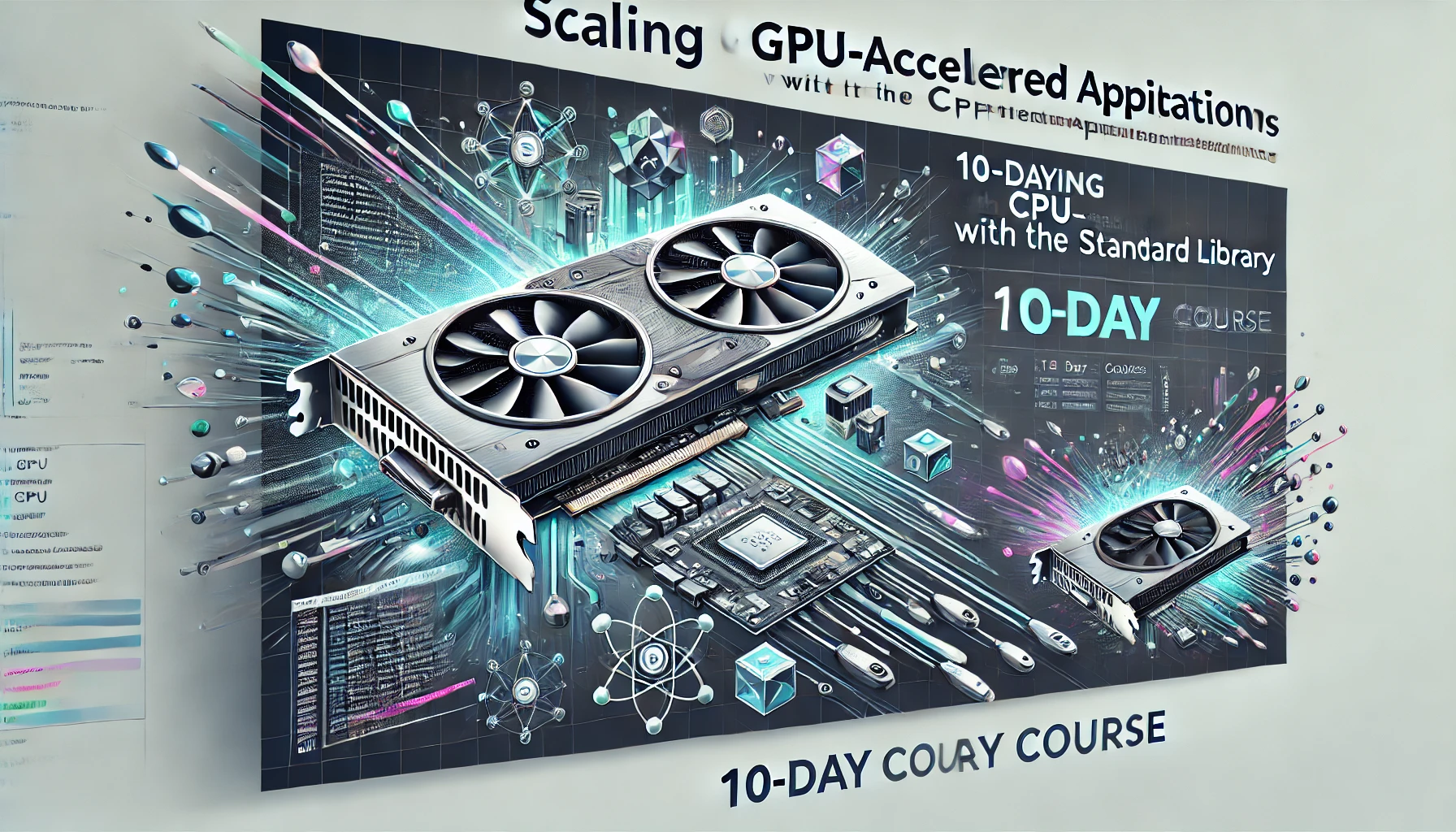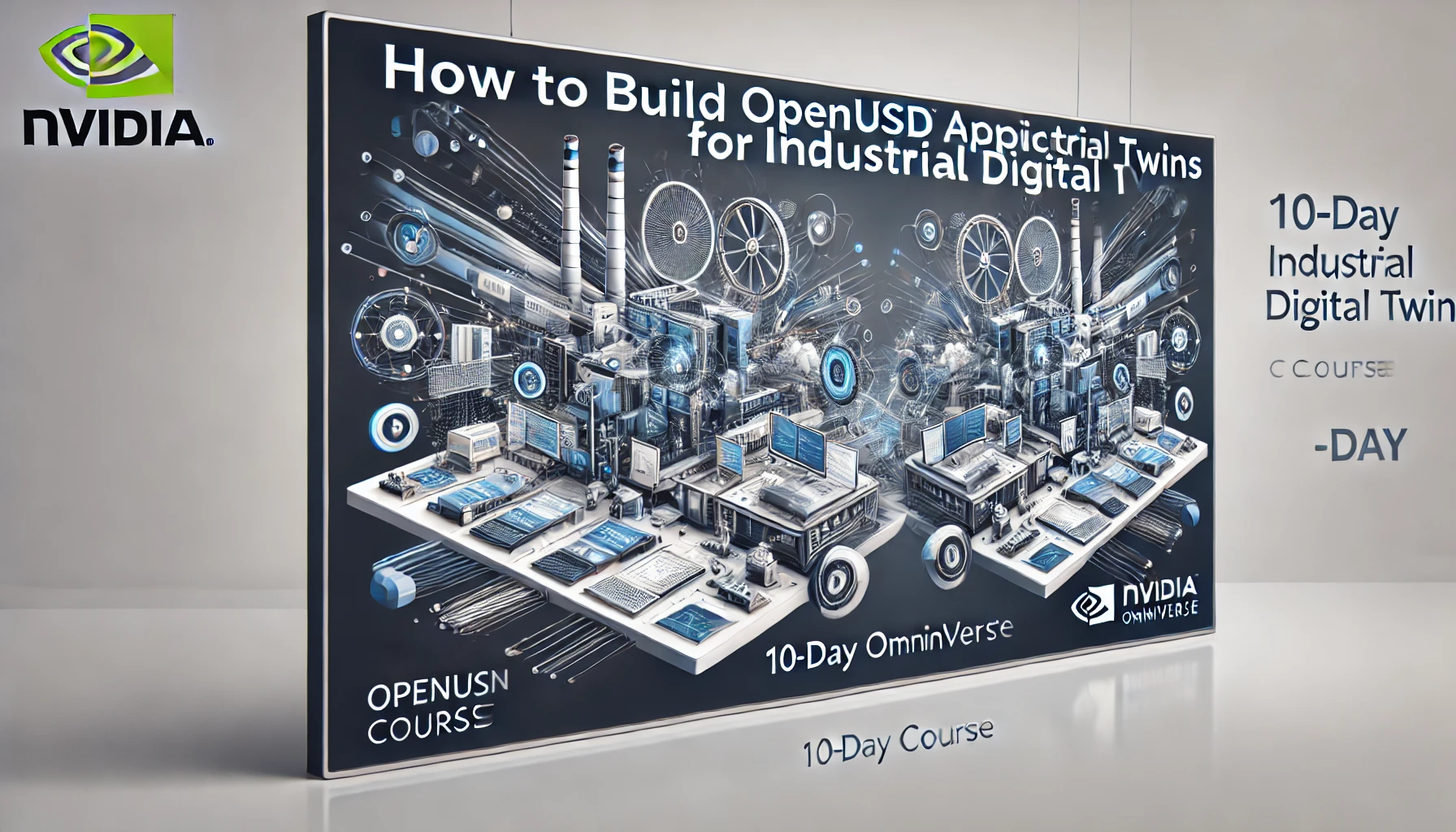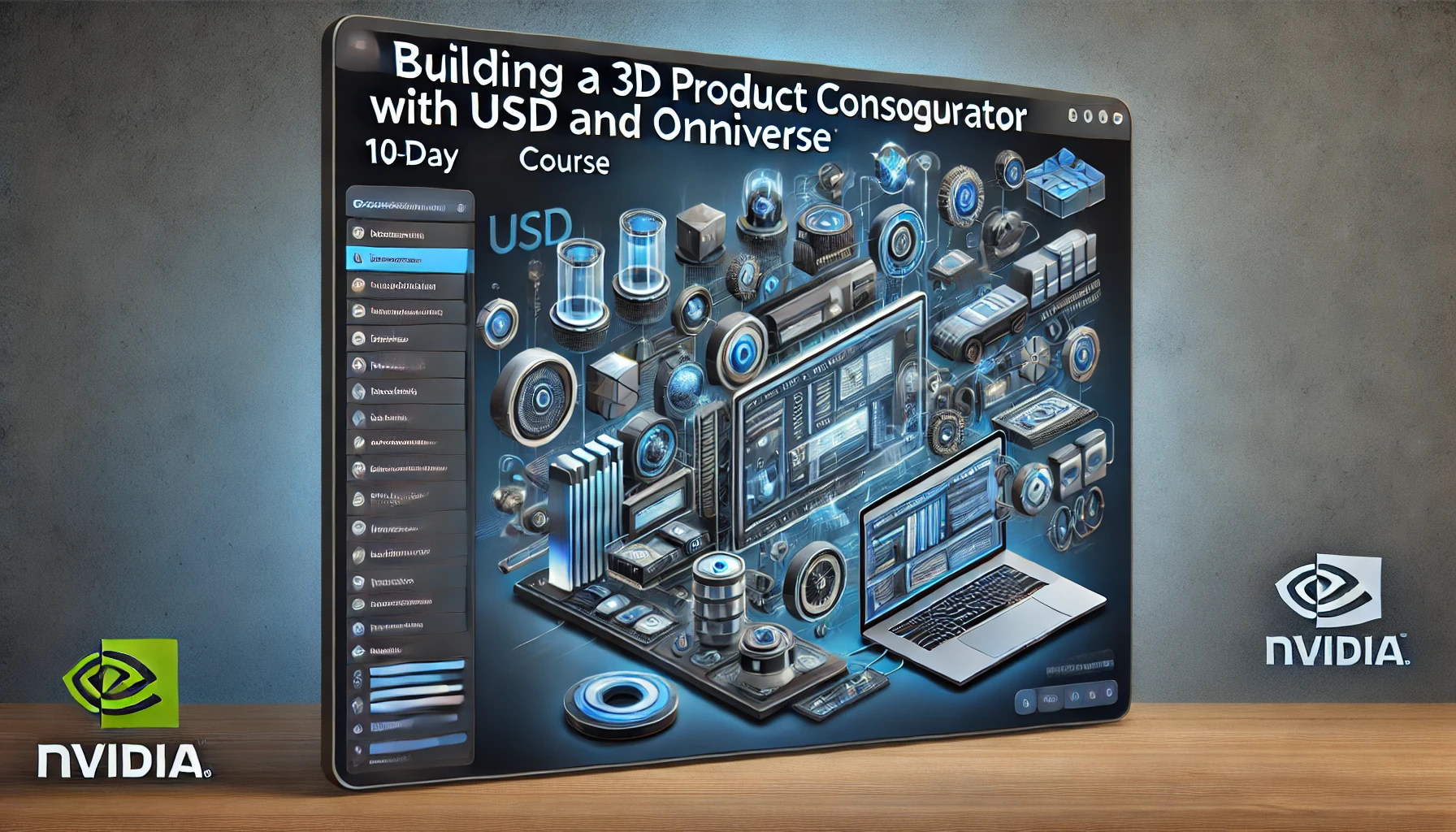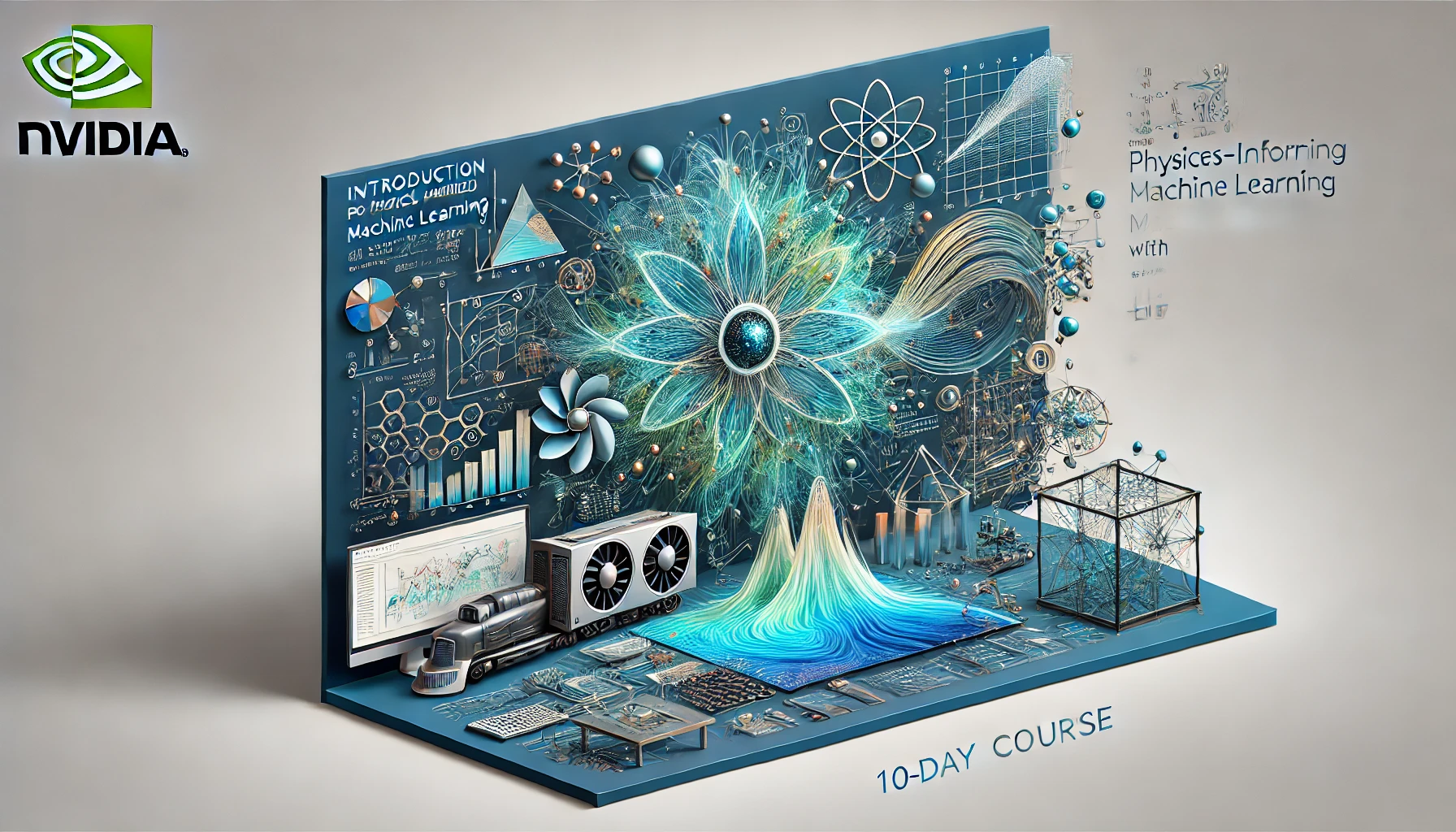Scaling GPU-Accelerated Applications with the C++ Standard Library
1. About the Course
“Scaling GPU-Accelerated Applications with the C++ Standard Library” is a 10-day intensive course designed to teach developers and engineers how to harness the power of GPU acceleration using C++, the NVIDIA HPC SDK, and MPI (Message Passing Interface). As the demand for high-performance computing (HPC) continues to grow, proficiency in these technologies is essential for building scalable, efficient applications that can leverage the parallel processing power of modern GPUs.
This course will guide you through the process of developing GPU-accelerated applications using C++ and the NVIDIA HPC SDK, while also incorporating MPI for distributed computing across multiple nodes. By the end of the course, you will have a comprehensive understanding of how to scale applications effectively using these powerful tools, optimizing both single-node and multi-node performance.
2. Learning Objectives
By the end of this course, participants will be able to:
- Understand the fundamentals of GPU acceleration and C++: Gain a deep understanding of how GPU acceleration works and how C++ can be utilized to develop high-performance applications.
- Utilize the NVIDIA HPC SDK for GPU programming: Learn how to leverage the NVIDIA HPC SDK to write efficient GPU-accelerated C++ code.
- Implement MPI for distributed computing: Understand how to use MPI to scale applications across multiple nodes in a cluster.
- Optimize GPU-accelerated applications: Apply optimization techniques to maximize the performance of GPU-accelerated C++ applications.
- Integrate the C++ Standard Library with GPU programming: Learn how to effectively use the C++ Standard Library alongside GPU programming for efficient code development.
- Develop scalable, high-performance applications: Gain the skills needed to develop scalable applications that perform efficiently on both single-node and multi-node setups.
3. Course Prerequisites
This course is designed for developers and engineers with a solid foundation in programming. The prerequisites include:
- C++ Programming: A strong understanding of C++ programming, including knowledge of advanced features such as templates, STL, and object-oriented programming.
- Basic Knowledge of GPU Computing: Familiarity with the concepts of GPU computing and parallel processing.
- Experience with Linux/Command Line Interface: Proficiency with the Linux operating system and command-line tools, as most HPC development is done in a Linux environment.
- Mathematics: A good grasp of mathematics, particularly linear algebra and calculus, which are often involved in high-performance computing applications.
4. Course Outlines
This course is structured to progressively build your expertise in scaling GPU-accelerated applications using C++, the NVIDIA HPC SDK, and MPI. The content is organized as follows:
- Introduction to GPU Acceleration and C++: Overview of GPU acceleration, C++ basics, and the NVIDIA HPC SDK.
- Setting Up the Development Environment: Installation and configuration of the necessary software tools, including NVIDIA HPC SDK and MPI.
- Understanding the C++ Standard Library for HPC: Utilizing the C++ Standard Library in high-performance computing contexts.
- CUDA Programming with C++: Writing and optimizing CUDA code in C++ using the NVIDIA HPC SDK.
- Optimizing Memory and Data Transfers: Techniques for optimizing memory management and data transfers in GPU-accelerated applications.
- Implementing MPI for Distributed Computing: Introduction to MPI and how to integrate it with C++ for distributed computing.
- Scaling Applications with MPI: Techniques for scaling GPU-accelerated applications across multiple nodes using MPI.
- Advanced Optimization Techniques: Advanced strategies for optimizing GPU-accelerated applications and improving performance.
- Integrating C++ with CUDA and MPI: Best practices for integrating C++ with CUDA and MPI for seamless, efficient development.
- Capstone Project: A hands-on project that involves developing and scaling a GPU-accelerated application using C++, the NVIDIA HPC SDK, and MPI.
5. Day-by-Day Breakdown
Day 1: Introduction to GPU Acceleration and C++
- Objectives: Understand the basics of GPU acceleration, the role of C++ in HPC, and the capabilities of the NVIDIA HPC SDK.
- Topics:
- Overview of GPU acceleration and its benefits
- Introduction to C++ and its relevance in HPC
- Introduction to the NVIDIA HPC SDK
- Activities:
- Reading materials on GPU acceleration and C++ in HPC
- External link: NVIDIA HPC SDK Overview
- Internal link: Regent Studies Advanced C++ Courses
Day 2: Setting Up the Development Environment
- Objectives: Set up and configure the development environment, including the installation of the NVIDIA HPC SDK and MPI.
- Topics:
- Installing the NVIDIA HPC SDK
- Setting up MPI on Linux
- Configuring the development environment for GPU programming
- Activities:
- Step-by-step installation and configuration guide
- Verifying the environment setup with sample code execution
Day 3: Understanding the C++ Standard Library for HPC
- Objectives: Learn how to effectively utilize the C++ Standard Library in high-performance computing contexts.
- Topics:
- Overview of the C++ Standard Library
- Using C++ STL containers in HPC applications
- Best practices for C++ programming in HPC
- Activities:
- Writing sample C++ programs that utilize STL in an HPC context
Day 4: CUDA Programming with C++
- Objectives: Write and optimize CUDA code in C++ using the NVIDIA HPC SDK.
- Topics:
- Basics of CUDA programming with C++
- Writing CUDA kernels in C++
- Compiling and running CUDA code with the NVIDIA HPC SDK
- Activities:
- Hands-on exercise: Writing and executing a simple CUDA program in C++
Day 5: Optimizing Memory and Data Transfers
- Objectives: Learn techniques to optimize memory management and data transfers in GPU-accelerated applications.
- Topics:
- Memory management in CUDA
- Optimizing data transfers between host and device
- Best practices for efficient memory usage in HPC
- Activities:
- Implement and analyze memory optimization techniques in CUDA programs
Day 6: Implementing MPI for Distributed Computing
- Objectives: Introduce MPI and demonstrate how to use it for distributed computing in C++.
- Topics:
- Overview of MPI and its relevance in HPC
- Setting up and using MPI with C++
- Writing simple MPI programs in C++
- Activities:
- Write and execute a simple MPI program in C++ that distributes computation across multiple nodes
Day 7: Scaling Applications with MPI
- Objectives: Learn how to scale GPU-accelerated applications across multiple nodes using MPI.
- Topics:
- Techniques for scaling applications with MPI
- Combining CUDA and MPI for multi-node GPU computing
- Profiling and optimizing multi-node applications
- Activities:
- Scale an existing CUDA application using MPI and measure the performance gains
Day 8: Advanced Optimization Techniques
- Objectives: Explore advanced strategies for optimizing GPU-accelerated applications.
- Topics:
- Advanced CUDA optimization strategies
- Performance tuning with NVIDIA tools
- Optimizing multi-node applications with MPI
- Activities:
- Apply advanced optimization techniques to a GPU-accelerated application and analyze the results
Day 9: Integrating C++ with CUDA and MPI
- Objectives: Learn best practices for integrating C++ with CUDA and MPI for efficient development.
- Topics:
- Integrating C++ Standard Library features with CUDA
- Best practices for using CUDA and MPI together
- Streamlining the development workflow
- Activities:
- Develop an integrated C++ application that utilizes both CUDA and MPI
Day 10: Capstone Project
- Objectives: Apply all the knowledge gained throughout the course to develop a fully functional, scalable GPU-accelerated application.
- Topics:
- Project planning and design
- Coding, testing, and optimizing the application
- Presenting the project and discussing the results
- Activities:
- Work on a real-world project that involves scaling a GPU-accelerated application using C++, the NVIDIA HPC SDK, and MPI
6. Learning Outcomes
By the end of “Scaling GPU-Accelerated Applications with the C++ Standard Library,” participants will be able to:
- Develop GPU-accelerated applications using C++: Confidently write and optimize C++ code for GPU acceleration using the NVIDIA HPC SDK.
- Scale applications with MPI: Implement MPI to scale applications across multiple nodes, enhancing their performance and efficiency.
- Optimize memory management and data transfers: Apply techniques to optimize memory usage and data transfers in GPU-accelerated applications.
- Utilize the C++ Standard Library in HPC: Integrate the C++ Standard Library effectively in high-performance computing applications.
- Implement advanced optimization techniques: Apply advanced strategies to optimize GPU-accelerated applications for maximum performance.
- Integrate C++ with CUDA and MPI: Seamlessly integrate C++ with CUDA and MPI for efficient, scalable application development.
Participants will complete the course with a deep understanding of how to scale GPU-accelerated applications using C++, the NVIDIA HPC SDK, and MPI. They will have hands-on experience with real-world applications, enabling them to build and optimize high-performance computing solutions effectively.
This course outline provides a comprehensive and engaging learning experience, ensuring participants gain the skills and knowledge needed to excel in high-performance computing with C++, CUDA, and MPI. Whether you are looking to advance your career or tackle complex computational problems, this course offers the tools and insights to help you succeed.




